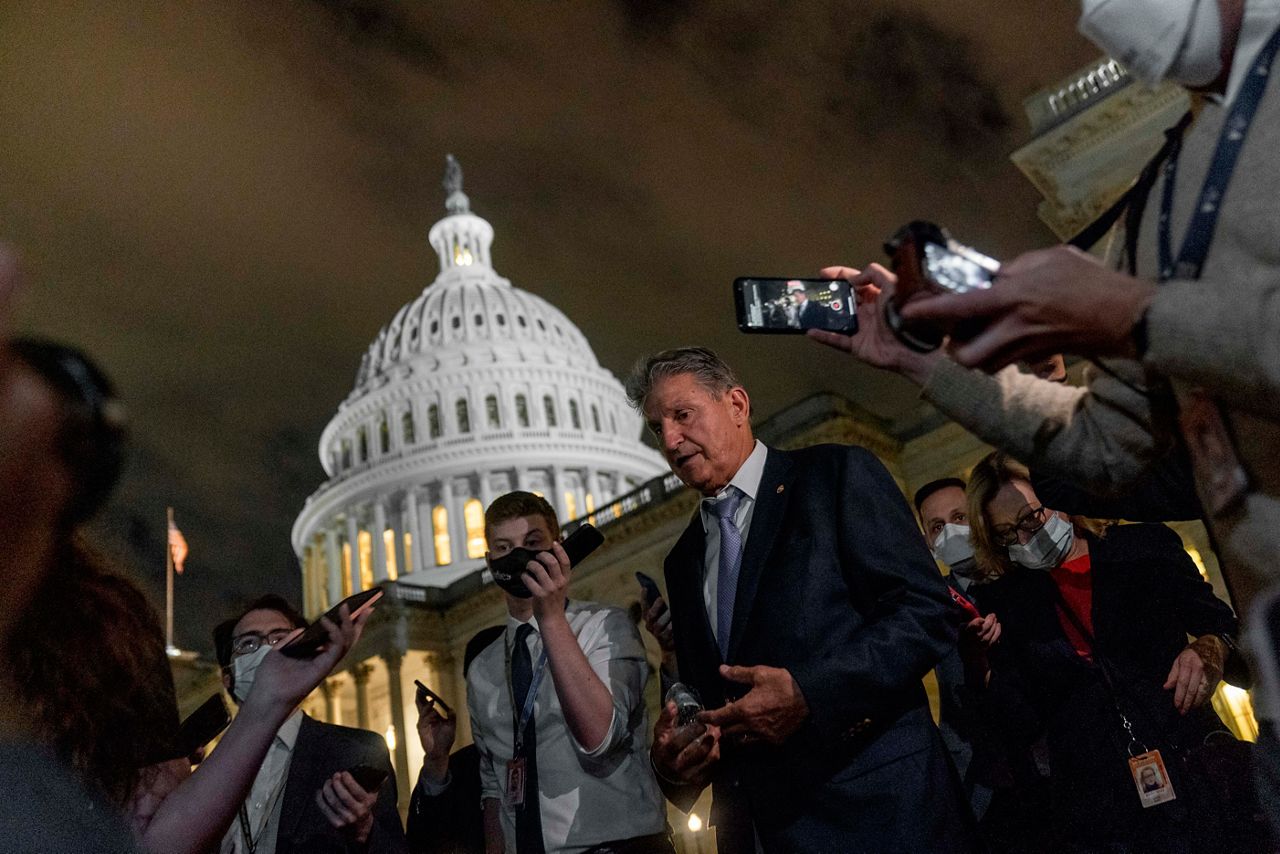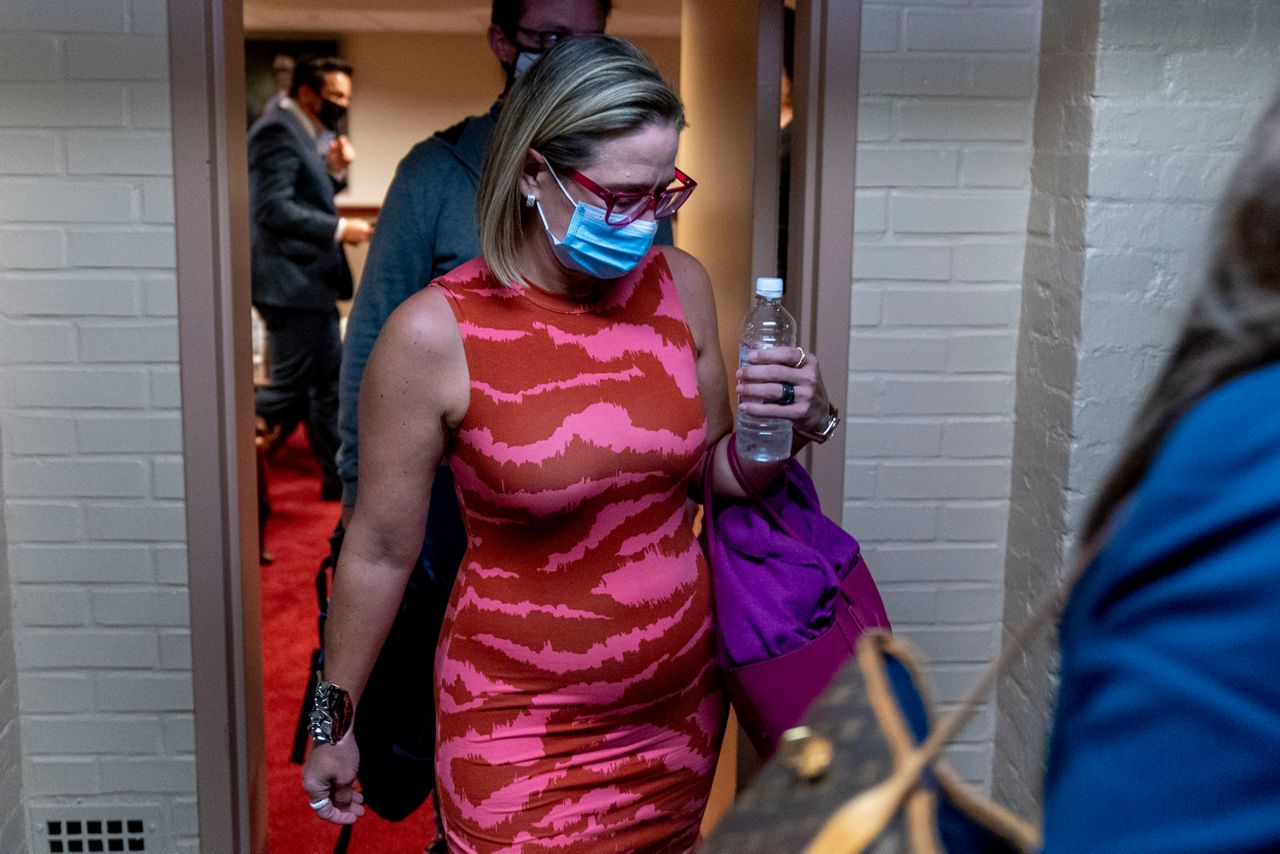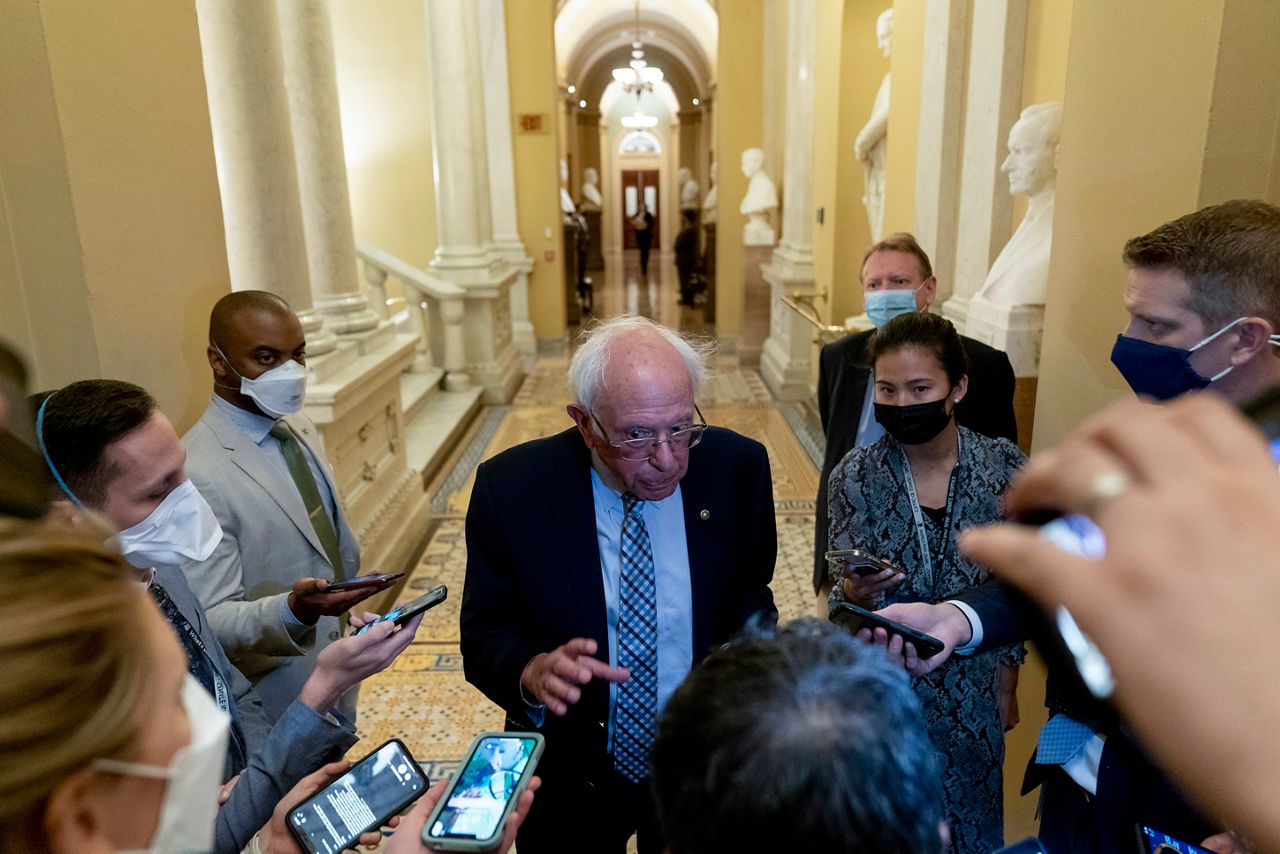Despite a spate of optimism from Democratic leaders, there was no agreement Thursday night on two key parts of President Joe Biden's domestic agenda – the Senate-passed $1 trillion bipartisan infrastructure agreement and a larger budget reconciliation bill containing policies championed by progressives.
After a late night on Capitol Hill, Democrats returned to the negotiating table Friday.
President Joe Biden traveled to Capitol Hill on Friday to speak with members of the House Democratic Caucus, the White House announced Friday afternoon.
President Biden emerged from the meeting with Congressional Democrats, hand-in-hand with House Speaker Nancy Pelosi, expressing optimism that the bills will pass.
"I’m telling you, we’re going to get this done," Biden said told reporters, who shouted questions asking the president about the timeline for the legislation.
"It doesn’t matter when," the president replied. "It doesn’t matter whether it’s in six minutes, six days or six weeks. We’re going to get it done."
According to multiple reports, citing those familiar with the meeting, the president suggested something in the range of $1.9-$2 trillion for the reconciliation bill, and urged lawmakers that both bills need to pass – but reportedly said that both bills need to be passed in tandem.
"The president is not going there to litigate the legislative path forward," White House press secretary Jen Psaki said ahead of Biden's meeting with lawmakers. "He's going there to make the case for how these two packages can help the American people. He will, of course, answer questions, and I'm sure that will be a part of the important engagement he has while he's on the Hill."
Psaki had earlier acknowledged the ideological divide between moderates and progressives on the two bills, saying in part: "We share common goals of creating good union jobs, building a clean energy future, cutting taxes for working families and small businesses, helping to give those families breathing room on basic expenses — and doing it without adding to the deficit, by making those at the top pay their fair share."
Biden and other White House advisors are seeking to bridge the gap between moderates and progressive Democrats and their respective desires for the plan: In short, progressives favor a higher-price package with more sweeping provisions on climate change and other issues, while moderates have balked at the high price tag and are pushing for a narrower bill.
The president will work with lawmakers on Friday to create a "unifying path to get both of these packages done," Psaki said, adding that with so many competing desires, "compromise is necessary, it's inevitable."
Rep. Hakeem Jeffries, the chair of the House Democratic Caucus, expessed optimism that there will be a vote on the infrastructure bill Friday, and that the vote will pass: "The Speaker has indicated that we're going to vote today, I expect to vote today, and I expect that the bill will pass today."
Speaker Pelosi had earlier vowed there would be a “vote today” on the $1 trillion infrastructure bill that is popular but has become snared in the broader debate. But that appeared increasingly unlikely, with no votes scheduled and chances for a quick resolution dimming as negotiations continued.
A vote was set Thursday on the $1 trillion bipartisan infrastructure bill, which passed the Senate in August by a wide margin, 69-30. The bill would provide funding for roads, bridges, clean water, broadband and other public works projects. Both Pelosi and Psaki said they expected a "winning" vote Thursday night, but the deadline came and went.
Pelosi had pushed the House into an evening session and top White House advisers huddled for talks at the Capitol as the Democratic leaders worked late Thursday to negotiate a scaled-back plan that centrist holdouts would accept. Biden had cleared his schedule for calls with lawmakers, but it appeared no deal was within reach, particularly with centrist Sen. Joe Manchin, D-W.Va.

"I don’t see a deal tonight. I really don’t," Manchin said as he left the Capitol on Thursday night. Politico reported Thursday that Manchin proposed a top-line figure of $1.5 trillion to Senate Majority Leader Chuck Schumer, D-N.Y., over the summer. The outlet obtained a copy of a document from July, signed by both lawmakers, which outlines the top-line figure, as well as other provisions, including raising the corporate tax rate.
With Biden working the phones and top White House officials shuttling at the Capitol, talk swirled of the Democratic leaders trying to ease off the stalemate by reaching a broader deal, a compromise with Manchin and Sen. Kyrsten Sinema of Arizona, two centrist Democrats who are the linchpins to Biden’s goals.

Sinema, for her part, sought to to dispel claims that she had not shared her views with Biden and Schumer, saying that in August, she shared "detailed concerns and priorities, including dollar figures, directly with Senate Majority Leader Schumer and the White House."
Sinema "continues to engage directly in good-faith discussions with both President Biden and Senator Schumer to find common ground," according to a statement, adding she does not "neogtiate through the press," making her public position somewhat more opaque.
Earlier Thursday, Sinema expressed that her conversations with the White House have been "productive" and noted that the two sides are "making progress."
The idea was to produce the contours of an agreement over Biden’s broader package, proceed with the $1 trillion public works bill and negotiate the rest of Biden’s big health care, education and climate change bill in the days to come. Lawmakers were told to stick around for possible late-night votes.
But as the night dragged on, it became clear that Manchin was not on board with a higher figure and chiseling away at that $3.5 trillion topline risked losing progressive leaders who said they have already compromised enough and saw no reason to rush a deal to bring the centrists around to supporting the president’s agenda.
“We’ve been fighting for transformative legislation as all of you know, these discussions have gone on for month after month after month,” said Sen. Bernie Sanders, I-Vt., the chairman of the Budget Committee and a leading progressive lawmaker. “This is not a baseball game. This is the most significant piece of legislation in 70 years.”

"It is an absurd way to do business, to be negotiating a multi-trillion dollar bill a few minutes before a major vote, with virtually nobody knowing what's going on," Sanders said. "That's unacceptable."
In a letter to colleagues late Thursday night, Speaker Pelosi called Thursday "a very productive and crucial day" and "a day of progress" in advancing Biden's agenda, but did not offer much else on a clear path forward: "Discussions continue with the House, Senate and White House to reach a bicameral framework agreement to Build Back Better through a reconciliation bill."
Pelosi pledged that "there will be a vote today" after leaving the Capitol shortly after midnight.
Attention remains squarely focused on Manchin and Sinema, two centrist Democrats who helped steer that bipartisan bill to passage, but have concerns that Biden’s overall bill is too big. The two senators have infuriated colleagues by not making any counter-proposals public.
People familiar with negotiations told Politico that Democratic leaders were hoping to sell moderates on a more modest $2.1 trillion topline divided into three key areas: Climate change, health care, and family issues like child care and paid family leave.
Under scrutiny, Manchin called an impromptu press conference Thursday outside the Capitol, insisting he has been clear from the start, but said he is "willing to sit down and work on the $1.5."
Democrats’ campaign promises on the line, the chairwoman of the Congressional Progressive Caucus, Rep. Pramila Jayapal, said exiting Pelosi’s office that the progressives’ views were unchanged -- they won’t vote for one bill without the other and would stay all weekend to get a deal.
“Inaction is insanity,” Rep. Ilhan Omar, D-Minn., a progressive leader, said, aiming criticism at Manchin's remarks. “Trying to kill your party’s agenda is insanity. Not trying to make sure the president we all worked so hard to elect, his agenda pass, is insanity.”
Centrists warned off canceling Thursday’s vote as a “breach of trust that would slow the momentum in moving forward in delivering the Biden agenda,” said Rep. Stephanie Murphy, D-Fla., a leader of the centrist Blue Dog Democrats.
At the same time, Congress mostly resolved a more immediate crisis by passing legislation to provide government funding and avoid a federal shutdown, keeping operations going temporarily to Dec. 3. The House quickly followed, and Biden signed the bill Thursday evening.
With Republicans opposed in lockstep to the president’s big plan, deriding it as slide to socialist-style spending, Biden is reaching for a deal with members of his own party for a signature legislative accomplishment.
Biden insists the price tag actually will be zero because the expansion of government programs would be largely paid for with higher taxes on corporations and the wealthy — businesses earning more than $5 million a year, and individuals earning more than $400,000 a year, or $450,000 for couples.
The Associated Press contributed to this report.



